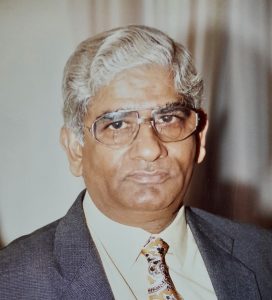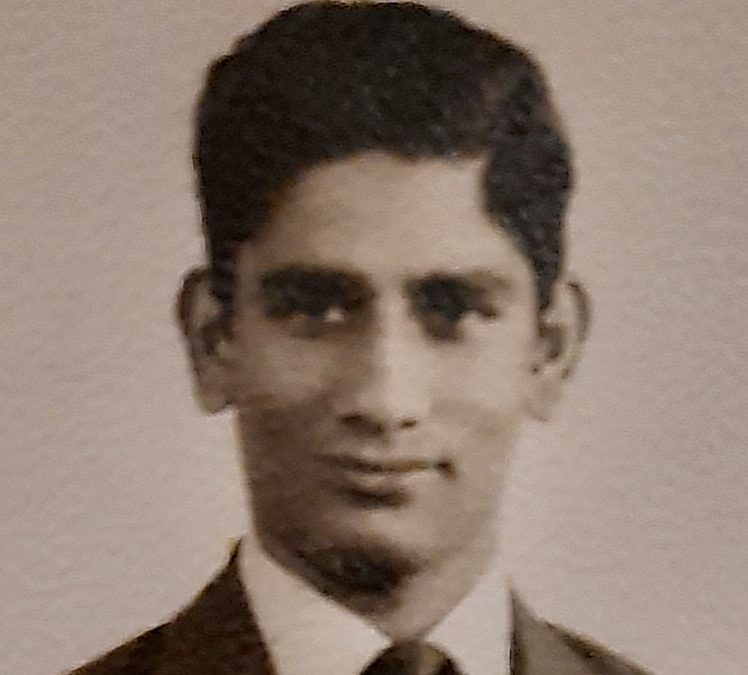
Ambassador Ramesh Chandra Shukla
The youngest of four sons, Ramesh was born on 8th February 1940 in the city of Kanpur into a family of educationists. His father Pandit Ram Chandra Shukla was the Principal Guardian to the Singhania brothers and a prominent member of The Theosophical Society of India.
Since his father lived away from home for his work, Ramesh grew up under the influence of his mother, Kamla, a strong lady who encouraged him to become the best that he could be and inculcated in him a deep respect for women and their rights to education and opportunities.
Kamla made sure there was more in the young boy’s life than school curriculum and to develop his character, he was enrolled in the Boys Scout when they lived in Lucknow and later in the National Cadet Corp where he learned shooting which would prove to be a popular skill later in life.
Education was highly valued and encouraged in his home. Ramesh being a brilliant student was a gold medallist all the way to his Masters in Mathematics from the University of Allahabad.
At University he was a hosteller in the A.N Jha Hostel better known as MUIR HOSTEL, which was considered the Indian Administrative Services (IAS) factory at the time. It was famous not just for producing thousands of bureaucrats but also for its enthusiastic soul.
Ramesh’s original intention was to follow the family tradition of becoming an academician but Destiny had something else planned for him.
After completing his Masters in Mathematics, young Ramesh got admission as a researcher in the prestigious Indian Statistical Institute, Trombay, Mumbai but soon returned to Allahabad to work as a Reader in his Alma Mater while he prepared for the elite Civil Service Exams.
Successful in his first attempt, Ramesh was an All India Rank Holder and joined the Civil Services in 1962 at the age of 22. He chose the Indian Foreign Service with Persian as his foreign language. Ramesh got married to Kusum in 1963 and together, they embarked for a career that would give him much satisfaction and Kusum the opportunity to gain experiences that would later influence her art.
In later years, Ramesh would joke that he joined the diplomatic service so he could see the world but the switch in career tracks happened quite innocently.
While working as a researcher at the Indian Statistical Institute, Ramesh had gone for a walk with his colleagues one evening on the beach of Mumbai. When he saw a man with a monkey amusing the crowds, he wanted to stop to enjoy the show but his colleagues scolded him and told him to concentrate on the walk.
This incident led to a lot of soul searching and Ramesh realized that while he loved mathematics and statistics, he was a people’s person and could not go through life in isolation with his research.
A 1962 batch officer, Ramesh served in various Missions in Iran, United Kingdom, Pakistan, the Consulate in New York, Afghanistan and Indonesia.
At the considerably young age of 40, he served as India’s Ambassador to Trinidad & Tobago with concurrent accreditation to the East Caribbean countries.
After a home assignment where in the role of Joint Secretary (Co-ordination) he was involved in the movement of dignitaries who had come for Prime Minister Indira Gandhi’s State Funeral, he went on to other assignments as Indian Ambassador to Denmark and then Qatar where he kept the morale of the Indian nationals boosted during the Gulf War.
Ramesh was India’s first Ambassador to Belarus with concurrent accreditation to Lithuania, and ended his diplomatic career as Indian Ambassador to Tunisia with concurrent accreditation to the State of Palestine.
A passion for books and culture ran in his veins and some of the highlights of his postings included watching the musical Hair in New York, theatre in London (he was delighted to see Sir Lawrence Olivier perform on stage) and season tickets to the Belarussian Bolshoi.
Popular with the Indian nationals and locals in each country where he served, one of the more amusing incidents relates to the Annual Indian Embassy Bazaar that was organized by the Embassy Ladies and local Indian community in Afghanistan to raise money for charities back in India.
These bazaars had lots of stalls including one for shooting beer cans. The biggest prize was a Teddy Bear but Ramesh only shot enough to win a beer can. His goal was to motivate others to try and win prizes too.
It wasn’t uncommon to have announcements asking him to return to the stall when sales slumped to shoot a few beer cans and encourage others to try! He was amply rewarded with a can of Heineken beer!
While Ramesh was interested in learning more about the cultures of the countries where he lived, his heart was in promoting awareness of Indian culture and whenever a cultural troupe was being sent to a neighbouring country by the Indian Council for Cultural Relations (ICCR), he would use his goodwill to arrange local sponsorship so that the cultural troupe would visit his city.
Ramesh was instrumental in getting a street named after India’s first Prime Minister, Jawahar Lal Nehru in Arhus, Denmark in 1988, now known as Nehrus Alle as well as the Danish translation of Nehru’s The Discovery of India.
The inclination of encouraging the promotion of Indian culture continued in Doha, Qatar where he was the Patron to the Indian Cultural Centre (ICC) and formally inaugurated the ICC on October 26, 1992.
A humble down to earth and friendly person, Ramesh was often roped in by his colleagues at the Foreign Office for important activities related to visiting foreign dignitaries.
This included being the translator for Queen Beatrix of The Netherland’s speech in 1986 when she was visiting Allahabad now known as Prayagraj. As he would jokingly tell his daughters, it was a daunting task as he wasn’t a Hindi translator and had to do a live translation in front of a large audience but it was worth the lamb chops served on the military aircraft on the journey to Prayagraj!
Post retirement in February 1997, Ramesh devoted his time to his wife’s art career and helping her build her portfolio.
A man with a vision ahead of his times, he worked with his wife, Kusum to create a website (a rarity for artists back them) that went live in August 2004 while pursuing writing articles both political and humorous for Indian newspapers and journals and sharing in the duties of caring for 4 miniature dachshunds who had joined the Shukla household in Doha.
Once, when asked about his views on Women’s Lib, his response was that it was the men who needed to be liberated from the shackles of a mindset that dictated male supremacy.
Ramesh wanted to write a book about his mother but sadly, the book never saw the light of day as he transitioned into the After Life in September 2004.
Ramesh was a Karma Yogi in the truest sense of the word and helped many during his lifetime. Many of his acts of kindness were known to the family who nicknamed him Friend of the World but the true extent of his service to fellow human beings emerged only after his death when people from all walks of life came forward with stories of how he had helped them and offered comforting words to the family.
Ramesh is survived by his wife, Kusum Shukla and 2 daughters who he raised to be their own persons, the way his mother would have expected.

